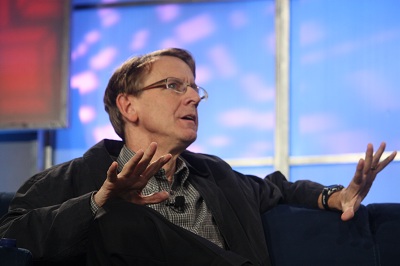Want smarter insights in your inbox? Sign up for our weekly newsletters to get only what matters to enterprise AI, data, and security leaders. Subscribe Now
 The New York Times ran a page one story today about how Silicon Valley appears to be in the midst of a new bubble, driven by the enthusiasm that venture capitalists and angels have for social networking and mobile apps businesses.
The New York Times ran a page one story today about how Silicon Valley appears to be in the midst of a new bubble, driven by the enthusiasm that venture capitalists and angels have for social networking and mobile apps businesses.
It cited the recent reports about how Twitter’s value has been pegged at $4 billion in its rumored round of investment. The story also pointed to the more than $5 billion valuation of Zynga, the creator of social games such as FarmVille on Facebook. And it pointed to Google’s willingness to pay $6 billion for Groupon, which was valued at $1.35 billion only eight months ago. Groupon evidently rejected the offer on Friday because it believes it is worth more.
Other signs, the newspaper said: A new pack of startups are coming in behind: Yammer raised $25 million; Tumblr raised $30 million; GroupMe raised $9 million; and Path raised $2.5 million. Those deals are causing some bearish investors to shake their heads.
The topic of a reinflating bubble has become a popular one at recent events such as the Web 2.0 Summit before Thanksgiving. There, John Doerr, managing director at VC firm Kleiner Perkins Caufield & Byers, said he believes we are in the midst of another tech boom driven by the vast changes in society caused by social networking and mobile technology. Bing Gordon, a partner at Kleiner Perkins, said that the firm hired Wall Street analyst Mary Meeker as part of an attempt to stay on top of the coming internet boom.
Fred Wilson, who was quoted in the New York Times story, wants to throw cold water on the froth. A partner at Union Square Ventures, Wilson had the foresight to invest in Twitter when Kleiner Perkins made the mistake of failing to do so (forcing Kleiner to try to invest now at a much higher valuation). He said in a debate with Doerr at the Web 2.0 Summit that we’re in the midst of a bubble. Angel investor Chris Sacca was also quoted in the Times as saying he has put a freeze on investments until startup valuations come down.
But the paper notes this is not a stock market bubble, since none of the companies mentioned have gone public. They’re raising big rounds from venture capitalists. Then they raise even larger secondary rounds from big private equity investors such as DST. Those investments allow them to keep growing their businesses without going public. And the outcome for many of these companies is to be acquired by the likes of Cisco, Intel, Microsoft, Google, or Apple. Those companies are sitting on mountains of cash. If the stock market crashes, those acquirers will be hurt as will the valuations of startups, but the acquisitions will probably continue.
Another difference is that in the age of Web 2.0, web-based companies are able to amass audiences very quickly — Zynga has more than 215 million monthly active users for its games even though it is just shy of four years old — and become profitable early on. By contrast, startups such as Pets.com in the frothy days of the dotcom bubble had no chance of making money. Angel investors are feeling the heat because they are getting priced out of a lot of early-stage deals as venture capitalists try harder to find “the next Facebook” earlier.
Which side of the fence are you on? The bears may eventually be right. But they may also miss out on a lot of money-making in the meantime if they sit on the sidelines of this latest gold rush. Please take our poll and comment on why you voted the way you did.
Online Surveys – Zoomerang.com

